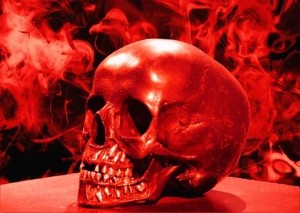“I embraced the honor/shame dynamic. But by committing unspeakable atrocities in service thereof, I only compounded my shame.”
 Gehinnom, April 29 – A martyred holy warrior for Islam admitted today he had expected his punishment in the afterlife to feature physical flames consuming his tormented flesh for all time, and that he had steeled himself to endure that possibility, but that instead of any conflagration as such, he in fact must undergo the far-worse immolation of everlasting humiliation over the crimes against other humans he committed while alive.
Gehinnom, April 29 – A martyred holy warrior for Islam admitted today he had expected his punishment in the afterlife to feature physical flames consuming his tormented flesh for all time, and that he had steeled himself to endure that possibility, but that instead of any conflagration as such, he in fact must undergo the far-worse immolation of everlasting humiliation over the crimes against other humans he committed while alive.
Muhammad Abu Razek, who died last week when a “work accident” in the Gaza Strip city of Khan Yunis resulted in his dismemberment, found himself standing before a heavenly tribunal over which Allah Himself presided, and faced a twofold rude awakening, he recalled Thursday: first, that his dedication to killing and harming infidels, especially Jews, thinking that he thus advanced the holy cause of Islam, rendered him not a righteous fighter for all that is good and Godly, but an evil perpetrator of heinous, irreversible acts that caused untold suffering and contributed to further proliferation of such evils; and second, that the sentence the Court pronounced against him, though presented in terms of the consuming fires of Hell, referred not to fire per se, but the burning, seething, unending shame of having chosen a path of evil despite a God-given conscience and the availability of choices that would not involve gleeful participation in causing untold suffering.
“It was enough of a shock to discover how wrong I’d been,” disclosed Abu Razek. “I can accept that, conceptually. But it hits harder to realize that the very thing I fought against my whole life, I actually created for myself. I embraced the honor/shame dynamic of Islamic culture, under which only uncompromising victory and humiliation of the enemy can resolve any conflict. It turns out that by accepting that dynamic and committing unspeakable atrocities in service thereof, I only compounded my shame.”
Experts noted that different personalities experience the afterlife in different ways, but that all such experiences stem from the choices available to them as humans with volition. “What Mr. Abu Razek describes as burning shame,” explained Beelzebub, “indicates the valence of honor and shame in his sensibilities, and how much the considerations of honor and shame, in his distorted worldview, drove the choices he made. Others, however, might possess a different psychic constitution, and might therefore describe in entirely different terms the torment of witnessing one’s potential juxtaposed with one’s choices, laid bare for all souls to see, but principally oneself to see. It’s all a matter of the barriers, if any, between oneself and the divine bliss of attachment to God, that one has constructed thorough one’s choices.”
Please support our work through Patreon.




